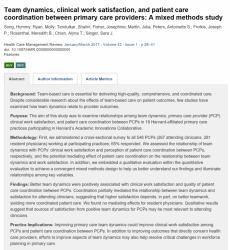
Background: Team-based care is essential for delivering high-quality, comprehensive, and coordinated care. Despite considerable research about the effects of team-based care on patient outcomes, few studies have examined how team dynamics relate to provider outcomes.
Purpose: The aim of this study was to examine relationships among team dynamics, primary care provider (PCP) clinical work satisfaction, and patient care coordination between PCPs in 18 Harvard-affiliated primary care practices participating in Harvard’s Academic Innovations Collaborative.
Methodology: First, we administered a cross-sectional survey to all 548 PCPs (267 attending clinicians, 281 resident physicians) working at participating practices; 65% responded. We assessed the relationship of team dynamics with PCPs’ clinical work satisfaction and perception of patient care coordination between PCPs, respectively, and the potential mediating effect of patient care coordination on the relationship between team dynamics and work satisfaction. In addition, we embedded a qualitative evaluation within the quantitative evaluation to achieve a convergent mixed methods design to help us better understand our findings and illuminate relationships among key variables.
Findings: Better team dynamics were positively associated with clinical work satisfaction and quality of patient care coordination between PCPs. Coordination partially mediated the relationship between team dynamics and satisfaction for attending clinicians, suggesting that higher satisfaction depends, in part, on better teamwork, yielding more coordinated patient care. We found no mediating effects for resident physicians. Qualitative results suggest that sources of satisfaction from positive team dynamics for PCPs may be most relevant to attending clinicians.
Practice Implications: Improving primary care team dynamics could improve clinical work satisfaction among PCPs and patient care coordination between PCPs. In addition to improving outcomes that directly concern health care providers, efforts to improve aspects of team dynamics may also help resolve critical challenges in workforce planning in primary care.

